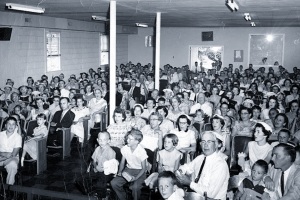Finding Messiah: A Hasidic Jew, a Missionary's Daughter, and a Bit of Calvinistic 'Luck'
His Jewish ancestors were leaders in an ultra-Orthodox Hasidic group in Poland. After his family was swept up in the tumult of World War II, they crossed multiple borders and boundaries in a desperate quest for freedom. He finally found true liberty in an unexpected way after landing in Brooklyn, N.Y.
"By the time my grandfather was 13, he had the first five books of Moses memorized in Hebrew," says Arnold Fruchtenbaum, the venerable founder of Ariel Ministries, an organization devoted to discipleship and biblical training for all believers. "By the time he was 18, he had the rest of the Old Testament memorized."
Arnold's grandfather had such clout in their community that he issued the final edict in the 'great tomato debate,' ruling that consumption of tomatoes was kosher for their community in Poland.
When the Germans invaded Poland and the Second World War began in Europe, the family fled to the Soviet Union. "We discovered the Russians were not treating the Jews any better than the Germans," Arnold recalls. In a tragic turn filled with irony, Arnold's father was accused of being a Nazi spy and was shipped to a prison in Siberia for several grueling years.
Arnold was born in Siberia in 1943, but after the war, the family returned to Poland, where they settled in the Jewish ghetto. During Passover, a vicious rumor spread that a three-year-old Polish boy had been killed by the Jews in a Passover-related ritual murder, and the boy's blood used to make unleavened bread.
One dreadful night
A mob formed of angry citizens and a horrible night of death and destruction ensued. They were led by priests waving large crosses. Arnold's family could hear the chants: "You killed Christ, so we'll kill you."
"Once again, Jews were killed in Jesus' name," Arnold notes. "This was the context in which I first head about Jesus. I thought the less I have to do with Jesus, the better."
After this ugly episode, the family fled to Czechoslovakia after border guards were bribed by the Israeli underground with American cigarettes. "For a carton of Camels you could purchase the freedom of a whole family of Jews. That's one day I walked a mile for a Camel."
When the communists seized power in Czechoslovakia in 1948, the family was uprooted once more. They trekked on foot through the forest until they got to the Austrian border, but the newly installed Russian border guards had strict instructions to not let anyone cross except Greeks.
Arnold's family members burned all their I.D. papers and decided to pose as Greeks. "None of us was Greek or could speak a single word of Greek, but neither could the Russians," he notes.
With God's help they got past the border guards who fell for the ruse, then landed eventually in West Germany in a displaced persons camp run by the British. More than 850,000 people were in DP camps spread throughout Western Europe for several years following World War II.
Ministry to the chosen people
A German Lutheran minister and his daughter visited the camp regularly, handing out food and clothing. They felt a special calling to reach the Jewish people for Christ, and befriended the Fruchtenbaum family. When the minister discovered that Arnold's family had applied to go to the United States, he gave them the torn cover of the magazine, "The Chosen People," published by the American Board of Missions to the Jews (ABMJ).
The minister said to look up the organization after they arrived in New York, and ABMJ would help them get settled. "All my mother understood was this was some kind of Jewish group in New York that would help immigrant Jews."
The Fruchtenbaums finally landed in a Jewish section of Brooklyn, New York, where Arnold attended public school. "My contact with Gentiles was very limited, because 99% of my school was Jewish," he recalls.
The family attempted to contact ABMJ after they arrived, but somehow, their contact information got lost in ABMJ's system for six years, until they opened a branch one mile from the family's home. Someone found a 3 x 5 card with Fruchtenbaum's contact info, paid them a visit, and invited them to attend a Hebrew-Christian meeting.
"When I first heard about the meeting it sounded like a rank contradiction in terms," Arnold recalls. "I was brought up to believe one is either a Jew or a Christian; he could never be both."
"If someone called himself both he was probably a schizophrenic," he adds.
With his curiosity aroused, 13-year-old Arnold attended his first meeting with the group. The more he heard, however, the angrier he became. "What bothered me was they used the Old Testament to talk about Jesus," he recounts. "I was brought up to believe we had our Bible, the Old Testament, and Christians had their Bible, the New Testament."
"They had the audacity to talk about their God, Jesus, in our Bible. I thought that took a lot of nerve."
Someone gave him a New Testament to take home with him. "Read it for yourself," the man said. "See if Jesus didn't do what the Messiah was supposed to have done."
Arnold took the book home, determined to prove the 'schizophrenics' wrong. His initial surprise as he began to read the Book of Matthew, was that it seemed thoroughly 'Jewish.'
Somewhat intrigued, but not completely convinced, Arnold ventured out to his second meeting with the group. He spent a long time talking with one of the leaders, going back and forth in the Scripture between the Old and New Testaments.
Finding Messiah
Suddenly the scales fell from his eyes and he recognized the one who was pierced, the promised one, the Jewish Messiah spoken about in the Book of Isaiah, chapter 53. "Everything meshed together so nicely I received Jesus as my Messiah and became a schizophrenic myself!" he says.
His faith and acceptance of Jesus as his Lord and Savior did not go over well in his family. During Arnold's high school years, his father's opposition grew in intensity. Arnold was forbidden to read the New Testament or attend any more meetings with followers of Jesus. When he began his senior year in high school, his father quit speaking to him altogether.
Arnold's father passed a message to him through his mother toward the end of his senior year in high school. Arnold would have to leave home upon his graduation. He also requested that Arnold leave the state.
After Arnold was kicked out by his father, his Heavenly Father provided for Arnold's needs in remarkable ways as he worked his way through college and later earned a masters degree from Hebrew University in Jerusalem. During his time in Israel, he witnessed the historic Six-Day War in 1967.
Then he returned to the U.S. and entered Dallas Theological Seminary for studies in Hebrew and Old Testament. He also began working as a missionary with ABMJ (today, Chosen People Ministries).
He actually became editor of the same magazine given to his family by the Lutheran minister in the displaced persons camp. Several times he wondered what happened to the man and his daughter who befriended his family. He made some initial inquiries, but had no success finding them.
In 1977, he founded Ariel Ministries, an organization that provides intensive biblical training and discipleship for both Jewish and Gentile believers.
Calvinistic 'luck'
Back in Germany, the Lutheran minister passed away, but his daughter always wondered what happened to the Fruchtenbaum family. Remarkably, she had prayed for Arnold and his family's salvation every day since they left the camp – well into the 1980s.
One day the woman's husband was browsing through a Christian bookstore and spotted Arnold's book, "The Footsteps of Messiah," translated into German. Knowing his wife liked biblical prophecy, but knowing nothing about her connection with Arnold, he bought the book for her.
When she saw Arnold's name on the cover, she wondered if it could possibly be the same person she knew in the aftermath of the war. She penned a letter to him, which brought great joy to both their hearts when they reestablished their long-lost connection.
"It was by Calvinistic luck that she got ahold of my book," Arnold says with amazement. "Her husband didn't know my story. He only bought the book because she was interested in prophecy."
"She is a great example of persistent prayer. She never gave up, not knowing if her prayers were answered or not."
Article originally published here: http://blog.godreports.com/2013/10/finding-messiah-a-hasidic-jew-a-missionarys-daughter-and-a-bit-of-calvinistic-luck-2/.





























